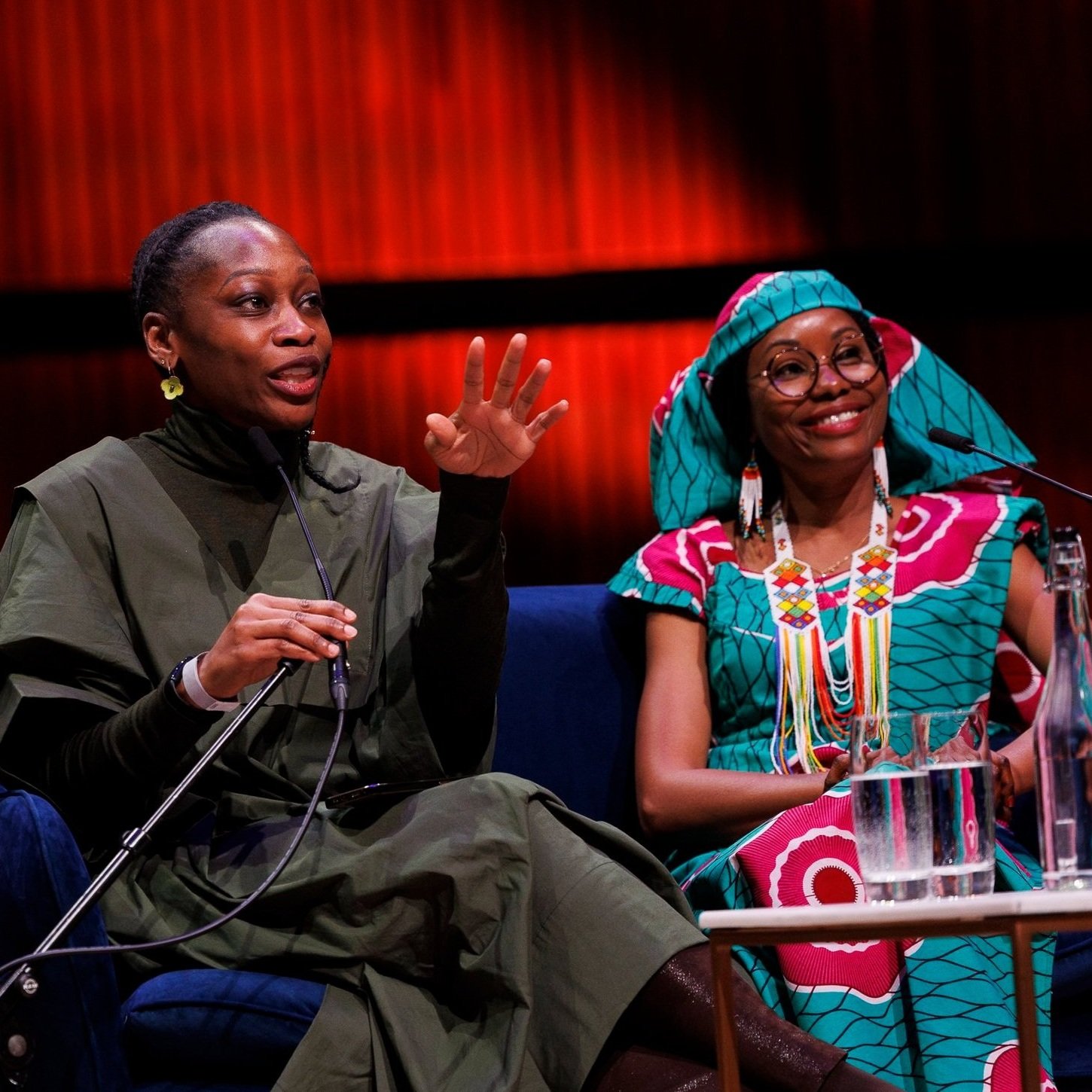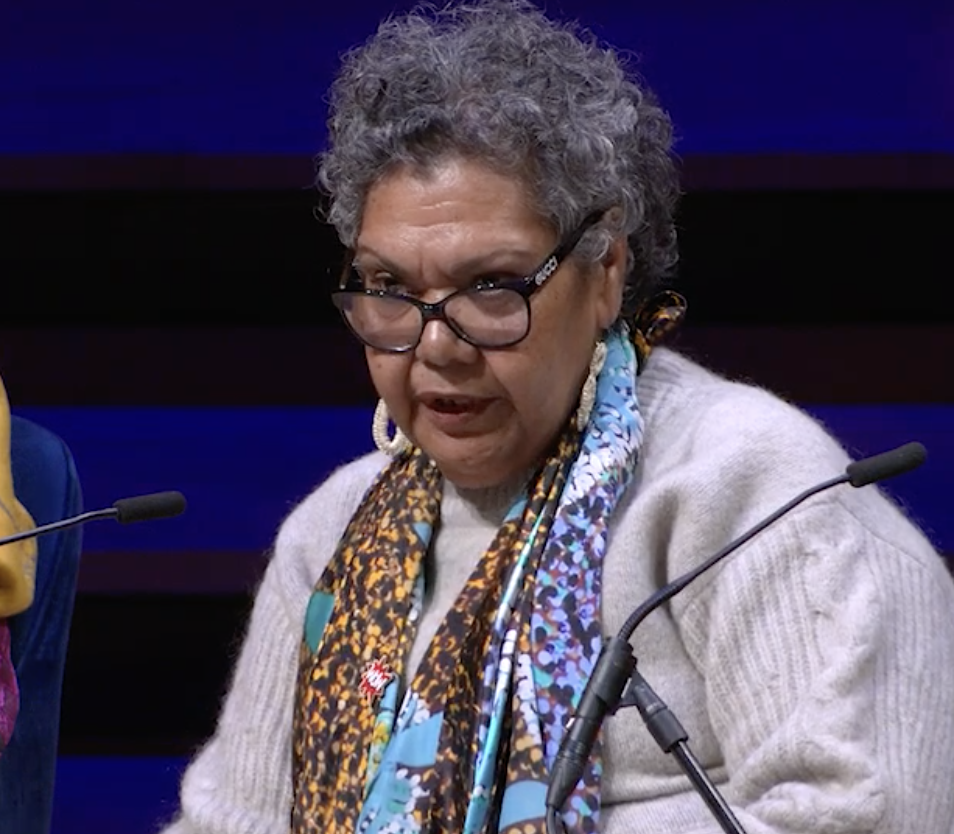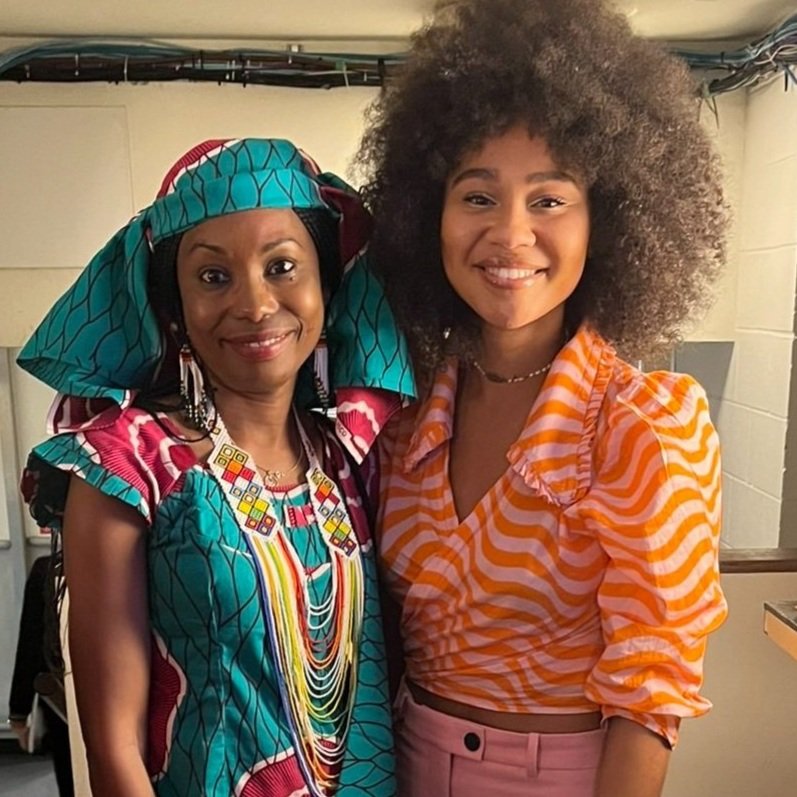This week, I’m writing about a favorite convening that is not called a conference but a festival — the WOW Festival! WOW for “Women of the World.”
(l-r) Mary Robinson, Jude Kelly CBE (WOW founder), Catherine Mayer, Sandi Toksvig, Pat Mitchell and Sandie Okoro (WOWGlobal chair)
And it is certainly that, as women come from every geography and generation to convene for a weekend of talks, panels, provocations, and performances… and there’s even shopping with goods from women-owned social enterprises for sale in the WOW Marketplace.
I joined in the learning and the fun (and yes, a bit of good cause shopping, too!) this past weekend as the WOW Festival convened in person again at the Southbank Arts Center in London. The Festival was full on every level with women of all ages and backgrounds and yes, some good men…one wearing an “I Show Up!” t-shirt.
And that’s what these convenings are all about. Showing up for the community, the connections, and the special experiences. I’ve been to WOW several times and I'm always impressed by the community and inspired by the content — among the most memorable to me: “Women, Power and Misogyny,” “Exploring Empathy through Hip Hop!” and “The Big O!” There were also demos on kickboxing, drumming, and always a favorite — “the Under 10 Feminist Corner.”
The Urgent Climate Conversation
This WOW, I was invited to participate in a panel on the climate crisis and to share the still-in-progress plans for a global campaign for climate justice led by women — named Project Dandelion. I’ll be writing more about it when the campaign launches officially this summer, but for now, it was encouraging to receive such a warm and enthusiastic reception from the 800 or so women and men who joined us in the majestic Royal Festival Hall. I was especially excited to share the stage with the great climate leader (and my personal climate mentor), Ireland’s first woman president, author of the book, “Climate Justice,” and current Chair of The Elders, Mary Robinson.
Connected Women Leaders panel at WOW London. (l-r) Mary Robinson, June Oscar, Pat Mitchell, Jude Kelly (Founder of WOW), Hafsat Abiola, Hindou Oumarou Ibrahim and Mikaela Loach.
Also on stage were other Connected Women Leaders (CWL) members, including Indigenous rights leader Hindou Oumarou Ibrahim from Chad and Nigeria’s Hafsat Abiola, who along with Ronda Carnegie and myself, is one of the managing partners of Connected Women Leaders.
We were joined by Australia’s powerful Aboriginal leader and Torres Strait Islander Social Justice Commissioner June Oscar and well-known UK youth activist and author Mikaela Loach. They both spoke eloquently about the catastrophic changes occurring now due to climate change as well as their leadership initiatives on climate, reminding the audience just how disproportionate the negative impacts of the climate crisis are on women!
Hindou Ibrahim spoke passionately about the situation in her country of Chad, sharing examples of the crisis among the rural populations who can no longer predict the weather. She talked about extreme events like the devastating droughts disrupting food supplies and transport to medical services, and how these drastic changes are already challenging local cultures and communities.
The Opportunity: Seven Years to Save the Planet
Apart from floods, fires, droughts and the enormous loss of land, homes and livelihoods around the world, all climate related, nearly 10 million lives are being lost every year due to air pollution caused by particles from fossil fuel consumption — more deaths than from HIV/AIDS, TB, and Malaria, combined. The largest portion of those deaths are women and children.
The case was made once again in all the stories and facts shared that the climate crisis is NOT gender neutral and we, the Connected Women Leaders cohort and our partners and allies, are calling on all the women of the world to join us in a women-led global campaign for climate justice.
We believe and have evidence to support that when women lead, action follows, and when it comes to the climate crisis, actions are necessary and urgent.
We have less than 7 years to reduce carbon emissions to habitable levels and to make more visible the work that is being done, much of it already led by women. We are on the cusp of a clean energy future which, if the transition is just and equitable, could lead to our ‘best times’ ever.
As Mary Robinson reminds us at every opportunity:
“We need everyone to make climate personal and a priority in their lives, and to envision the future we want to live in and secure for our children and grandchildren.”
We have begun the work to secure this future with Project Dandelion. Over the next few months, Mary, Hindou, Hafsat, myself, and women leaders from every continent will be talking about Project Dandelion everywhere women and our male allies convene and connect. The mission will be to engage all the world’s women leaders, at every level of leadership, as a new collective force, prepared and persistent in our demands for the actions necessary to avoid the catastrophic future ahead if we don’t act now — with justice at the center of our solutions.
Why Project Dandelion? Dandelions grow on every continent and are resilient and restorative. In some places, they are used by farmers to restore overused land. They make healthy additions to teas and food, and most importantly, their primary purpose is to seed more dandelions. Surely, all of us did that ‘poof’ bit as a child — blowing on them to make the seeds fly through the air to find more places to root and grow.
That’s our purpose, too. To ’seed’ the actions necessary to restore the balance between humans and the natural world. We aim to protect and regenerate the resources that sustain life with nature-based solutions; to reduce carbon emissions by nearly half by 2030 to get back on course for a habitable environment; to address the loss and damage that the most vulnerable communities and countries have already endured; and to demand from companies and governments the actions and policies necessary to secure a just, more equitable and sustainable home for everyone, everywhere.
We made the first public call to action at WOW and will take our learning from this community as we further shape the Project Dandelion campaign. It is our intention to strengthen climate work currently underway and inspire millions more to embrace the reality of climate justice as an intersectional opportunity to advocate for gender justice, racial justice, indigenous rights justice, economic justice and more.
After our call to action at WOW, CWL co-director and president of the Women in Africa Initiative Hafsat Abiola captured the spirit and summed up our purpose and our plan with a reminder of that great African proverb:
“If you want to travel fast, travel alone. If you want to travel far, travel together.”
It was a true WOW moment when the connection was made that this is why we come together as engaged communities of women leaders and male allies — to travel fast when necessary (as it is with this climate emergency) and to travel together — so that the outcome of our work goes further, is fairer and more just.
Onwards!
- Pat








